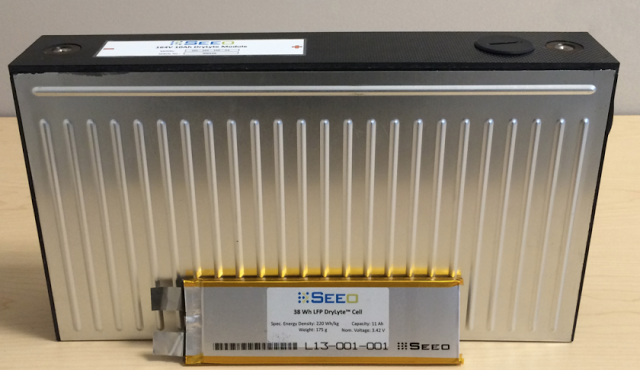German company Bosch acquired California Battery startup Seeo.
Seeo submitted batteries for official testing late last year, claiming an energy density of 220 watt-hours per kilogram. CEO Hal Zarem told GigaOm’s Katie Fehrenbacher that the company had “started working on a second-generation battery” which will have an energy density of 400 watt-hours per kilogram, claiming that the company’s current batteries were at 300 watt-hours per kilogram. (Keep that “400” number in mind.) The second-generation Li-ion batteries use polymer solid-state electrolytes and metallic lithium anodes.
Here’s a guide to gravimetric energy density:
117 watt-hours per kilogram: The level Tesla and Panasonic were achieving in 2008 for the Roadster
200 watt-hours per kilogram: The level Sonny Wu, Boston-Power’s CEO, says the company is achieving today
250 watt-hours per kilogram: The approximate energy density of the batteries in the Tesla S
400 watt-hours per kilogram: According to Tesla’s Elon Musk, the concept of battery-powered transcontinental airplanes becomes “compelling” once batteries hit 400 watt-hours per kilogram
400 watt-hours per kilogram: The level that battery aspirant and ARPA-E grant recipient Envia claimed it could achieve
The Seeo battery operates at a temperature of 178 degrees Fahrenheit. It may not need a cooling system but it definitely needs a heating system. At least it will if it is going to be used in electric vehicles. Bosch obviously believes it can overcome that obstacle and make the new battery commercially viable; we won’t know if that is true for several years.
SOURCES – Ecomento, Greentechmedia

Brian Wang is a Futurist Thought Leader and a popular Science blogger with 1 million readers per month. His blog Nextbigfuture.com is ranked #1 Science News Blog. It covers many disruptive technology and trends including Space, Robotics, Artificial Intelligence, Medicine, Anti-aging Biotechnology, and Nanotechnology.
Known for identifying cutting edge technologies, he is currently a Co-Founder of a startup and fundraiser for high potential early-stage companies. He is the Head of Research for Allocations for deep technology investments and an Angel Investor at Space Angels.
A frequent speaker at corporations, he has been a TEDx speaker, a Singularity University speaker and guest at numerous interviews for radio and podcasts. He is open to public speaking and advising engagements.


